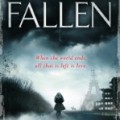 By Traci L. Slatton, Author of Fallen
By Traci L. Slatton, Author of Fallen
This topic fascinates me, because I wrestle with it every day. I am a creative person and I have a lot of ideas for stories. I’m also hungry. I’m starving to write 100 books before they peel my cold, dead fingers off my keyboard and lay me in a plain pine box. Then there’s another consideration: writing is misery. Every page is agony.
Ideas come and I take notes. If I’m walking, I’ll make a voice memo. Usually characters stuck in tense situations, and bits of their dialogue, come to me first. Sometimes I’ll get a palpable feeling-sense of a relationship: the tenderness and eroticism and playfulness and fierceness of it. I also see my main characters in my mind’s eye. With FALLEN, my recent post-apocalyptic romance, I had a vision of Europe in shambles, and a man and a woman who were both very strong and very tormented. She was willing to do anything to keep some children alive, but she was strongly connected to an absent husband. So the premise came to me first. I had a clear sense of the man as good and bad, a leader, a striated human soul. I could feel his essence.
 Usually I won’t start writing until the idea threatens to shove bamboo shoots up my fingernails if I don’t write it. That’s when compulsion has set in. The beginning is great fun. It’s a rush. I’ve never been interested in drugs but I always think that the rush of creative energy when I finally surrender to a story must be like the rush of some potent chemical. It’s intense, it’s alchemical, it consumes me. It’s like falling in love, because it’s all I can think about. I walk down the street with scenes scrolling through my brain. I feel alive in a new way.
Usually I won’t start writing until the idea threatens to shove bamboo shoots up my fingernails if I don’t write it. That’s when compulsion has set in. The beginning is great fun. It’s a rush. I’ve never been interested in drugs but I always think that the rush of creative energy when I finally surrender to a story must be like the rush of some potent chemical. It’s intense, it’s alchemical, it consumes me. It’s like falling in love, because it’s all I can think about. I walk down the street with scenes scrolling through my brain. I feel alive in a new way.
After that initial rush, the work sets in. Maybe it’s like a marriage at this point. You know, when the honeymoon has worn off and you’re sick of picking up your spouse’s toenail clippings from the coffee table and you just want to throw a heavy wrench at his head. It’s a lot of unglamorous work. Here’s when I mock up an outline of the story, the main turning points, and the character arc. I grapple with the nuts and bolts of story, and the fundamentals of what I aim to do with this particular one.
Best I’ve figured out, and this is an on-going inquiry for me, story is what your main character wants and how they DON’T get it. All story has a common source: it’s an argument for a specific value. And all good fiction has two qualities: 1, it’s about truth but not necessarily about fact, and 2, it is structured around conflict and obstacle.
So I have scenes, obstacles, disasters, bits of dialogue, and the faces of my characters all jumbled up in my brain, and I sit down and start writing the first few chapters. Then I pause to write an outline. I also figure out what value I am arguing for. I am opinionated and I have strong values, which helps. I write out my value on a sticky note and tape it to the side of my iMac.
I also almost always have a clear sense of the ending of the story. With FALLEN, I saw my heroine riding off without her man. I saw her heart-broken and determined. I enjoy writing stories where the stakes are high, so I tweak the plot points to up the ante. How can I push a scene? How can I turn up the volume on a character’s breaking point?
Writing is an arachnoid process: it’s like weaving an intricate web from the silk in my gut. That weaving happens in the back and forth between the vast, oceanic creative flow and the careful structuring of analytical thought. Both are crucial.
I usually do research as I am writing. I’ll pause in the middle of a page and read six chapters in a book, or google around the internet, or send emails to people I know who might have answers. A small plane flies from Edmonton to Le Havre in FALLEN, so I emailed my friend Geoffrey, who’s a pilot, to ask him how that would be done. He had some ideas and he emailed some of his friends, too. When I have my answers, I resume writing. If I need to do further research, then, after a day or so, I’ll keep writing and start reading the necessary texts at night.
The end is another rush, because I get excited to torture my main characters more intensely, and so finish the story. Finally I have a first draft. Here’s where I ask a few trusted friends to read and critique. I’ve also found a free-lance editor who is scary smart, and I have her read the draft. Then I go back and revise, revise, revise . . .
© 2011 Traci L. Slatton, author of Fallen
Author Bio
Traci L. Slatton, author of Fallen, is a graduate of Yale and Columbia, and she also attended the Barbara Brennan School of Healing. She lives in Manhattan with her husband, sculptor Sabin Howard, whose classical figures and love for Renaissance Italy inspired her historical novel Immortal and her contemporary vampire art history mystery The Botticelli Affair. Fallen is the first in a romantic trilogy set during the end times.
For more information please visit http://www.

Sorry, the comment form is closed at this time.